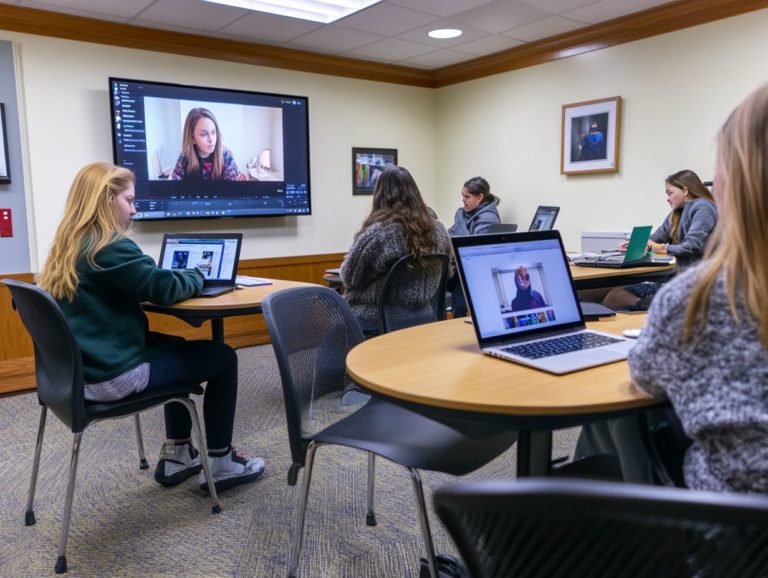5 Common Challenges in Online Master’s Learning
Going through an online master’s program can be an exciting journey with its ups and downs. You ll hone your time management skills while also tackling feelings of isolation unique hurdles that can shape your educational experience.
This article explores five common challenges that online master’s students face, such as the quest for self-discipline, technical glitches, and balancing work and study. Let’s tackle these challenges head-on to ensure your success!
You ll discover practical solutions and resources designed to help you thrive in this digital learning environment. Whether you re setting out on this journey or are already immersed in your studies, understanding these obstacles is a crucial first step toward achieving your academic goals.
Contents
- Key Takeaways:
- 1. Time Management and Self-Discipline
- 2. Lack of Face-to-Face Interaction
- 3. Technical Difficulties
- 4. Balancing Work and School
- 5. Feeling Isolated and Disconnected
- How Can These Challenges Be Overcome?
- Frequently Asked Questions
- 1. What are the common challenges faced by students in online master’s learning?
- 2. How can time management be a challenge in online master’s learning?
- 3. What technical difficulties can students face in online master’s learning?
- 4. How does the lack of in-person interaction impact online master’s learning?
- 5. How can students stay self-motivated in online master’s learning?
- 6. Is it possible to maintain a work-life balance while pursuing an online master’s degree?
Key Takeaways:

Time management and self-discipline are crucial for success in online master’s learning. Online students may face challenges due to a lack of face-to-face interaction, but they also develop essential skills that enhance their learning experience. Additionally, technical difficulties can hinder the learning experience for online master’s students.
1. Time Management and Self-Discipline
In today’s rapidly shifting educational landscape, especially with the surge of online education, mastering time management and self-discipline is essential for navigating your academic responsibilities.
To excel, use effective time management techniques and digital tools, like calendars and task management apps. These are your allies.
They help you carve out dedicated study periods, set milestones, and track progress. Cultivating self-discipline is equally important; you ll face distractions at home, from social media to household chores.
Create a structured routine and set motivational goals. Treat yourself to a reward once you complete a task; this can nurture productivity.
Ultimately, these approaches will refine your study habits and help you reach your educational aspirations.
2. Lack of Face-to-Face Interaction
The shift to online learning, especially during the COVID-19 pandemic, has brought notable challenges. One significant hurdle is the absence of face-to-face interaction, which is crucial for social connections and communication. To navigate these challenges, exploring essential resources for online master’s students can be incredibly beneficial.
This transition often stifles relationship development among peers and impacts collaboration and the sharing of insights. You may struggle with communication issues in these digital spaces, making it essential to explore innovative ways to nurture connection.
Use collaboration tools like Zoom and Google Meet to facilitate real-time discussions and group activities. Breakout rooms can create smaller, more comfortable settings for engaging with peers.
Utilize chat features during video calls for sharing thoughts and questions simultaneously. Also, make virtual classrooms interactive by introducing polls or quizzes to boost participation and alleviate feelings of isolation.
These strategies can significantly enhance communication and foster a cohesive learning environment for you and your fellow students.
3. Technical Difficulties
As your reliance on educational technology increases in online courses, you may face technical difficulties that can hinder your learning experience. These challenges, such as connectivity issues and software glitches, often leave you feeling frustrated. It’s important to address common myths about online master’s degrees to better navigate these hurdles.
Distractions at home make it clear that we need to address the root causes of these problems. Helpful student feedback is an invaluable resource for improvement.
To tackle these challenges, developing a solid routine is crucial. By setting specific study hours, you can create a conducive learning environment. Investing in a reliable internet connection and familiarizing yourself with essential software tools will help minimize disruptions.
When you encounter obstacles, talk openly with your instructors and tech support about any issues. Strengthening communication systems ensures that solutions are provided swiftly, helping you maintain your motivation and focus.
By adopting these best practices, you empower yourself and significantly enhance your online learning journey.
4. Balancing Work and School

For adult learners diving into online education, balancing work and school is no small feat. It demands effective time management and access to the right study resources.
If you find yourself juggling professional responsibilities alongside academic commitments, you may encounter stress and burnout. Adopting strategies to prioritize your tasks and seek helpful feedback can help.
Finding this balance is crucial. Personalized strategies can help you succeed in both areas.
One key strategy is to establish a structured schedule that dedicates time blocks for work and study sessions. This ensures that nothing falls through the cracks.
Make sure you explore the wealth of study resources available right now video tutorials, online forums, and study groups can significantly enhance your understanding.
Actively seeking and incorporating feedback from peers and instructors can provide invaluable insights, facilitating continuous improvement in your learning journey.
By implementing these strategies, you can create a more manageable and enriching educational experience.
5. Feeling Isolated and Disconnected
The feeling of isolation and disconnection is a common challenge for students engaged in online learning. Traditional social interaction often takes a backseat, which can drag down your motivation. By following 5 tips for succeeding in online graduate studies, let’s tackle it together!
By implementing peer review mechanisms and utilizing collaboration tools, you can bridge the gap and foster social interaction that enhances your online learning experience.
The psychological impact of being physically separated from peers can lead to decreased engagement and heightened anxiety. To counter this, consider incorporating virtual study groups, forums, or chat rooms; these can effectively alleviate loneliness and encourage camaraderie among learners.
Regularly scheduled video calls and group projects not only boost accountability but also create valuable opportunities for socialization. By nurturing these connections, your online environment can evolve from solitary to collaborative, paving the way for improved motivation and a more enriching learning journey.
How Can These Challenges Be Overcome?
Overcoming the challenges of online education calls for a varied approach that combines motivation strategies, effective use of educational technology, and continuous feedback from students to avoid common pitfalls.
By cultivating a proactive learning environment, you can tackle issues like technical difficulties and feelings of isolation. This ultimately enhances your experience.
It s essential to explore innovative solutions that meet diverse learning needs and promote engagement in virtual classrooms.
For example, turning learning into a game can transform mundane tasks into exciting activities that spark enthusiasm and drive.
As an educator, actively seek feedback through surveys or informal check-ins. This helps you assess your progress and adapt your teaching methods accordingly.
Creating virtual study groups or discussion forums fosters a sense of community, helping to combat loneliness.
By mixing motivation techniques with a responsive approach, you can create a more productive and enjoyable online learning atmosphere for everyone involved.
What Resources Are Available for Online Master’s Students?
As an online master’s student, you have access to numerous study resources designed to elevate your learning experience and ensure your academic success.
These resources harness advanced educational technology and peer review processes, including online libraries, virtual tutoring services, and collaborative forums.
Here, you’ll find an environment that encourages constructive feedback, allowing you to engage critically with educational content and deepen your understanding.
Digital platforms provide webinars and workshops to offer expert insights and practical skills essential for your academic and professional growth.
Comprehensive academic support services, such as writing centers and research assistance, equip you with the tools necessary to excel in your coursework.
Peer collaboration platforms cultivate a sense of community. They enable you to network, share resources, and collaborate on projects, enriching your learning journey.
With such a robust array of resources at your disposal, you are not only prepared for your studies but also immersed in a richer educational experience.
How Can One Maintain a Healthy Work-Life-Study Balance?

Maintaining a healthy work-life-study balance is essential as an adult learner, often juggling multiple responsibilities. Effective time management and practical motivation strategies are key to navigating your daily commitments successfully.
By adopting structured routines and identifying distractions in your home environment, you can create a space that promotes study while allowing time for personal and professional growth.
Establishing specific study times in your weekly planner can sharpen your focus, enabling you to engage fully with your academic tasks without feeling overwhelmed.
Breaking down larger projects into smaller, manageable goals makes the process less intimidating and helps maintain your motivation.
Incorporating short breaks during study sessions can boost your productivity and prevent burnout, ensuring your energy levels stay high.
Set personal rewards for achieving milestones to reinforce positive behaviors and keep your drive alive.
Prioritize your mental health to thrive by practicing self-care, like regular exercise and social interactions.
Start implementing these strategies today for a more balanced life!
What Are Some Tips for Improving Time Management Skills?
Improving your time management skills is crucial for navigating online learning. Effective organization can dramatically reduce tech issues and boost your performance!
Try simple strategies like setting clear priorities and making the most of study resources. You can also use motivation techniques to optimize your educational journey and achieve your goals.
To refine your time management, consider using planners, whether digital or on paper, to track assignments and deadlines. Online tools such as scheduling apps can provide handy reminders and help you break larger tasks into manageable segments, making it easier to stay focused.
Setting realistic deadlines for each assignment can alleviate last-minute stress and encourage a more consistent workflow. Carving out specific study times is beneficial, too; treat these sessions as non-negotiable appointments. This approach helps you balance your coursework with other commitments seamlessly.
How Can One Stay Engaged in an Online Learning Environment?
Staying engaged in an online learning environment is vital for your academic success. Without physical presence, it’s easy to struggle with motivation and focus.
You can adopt various strategies to enhance your experience. For instance, participating in discussion forums, collaborating on projects, and immersing yourself in educational content can significantly boost your engagement.
These approaches cultivate a sense of community and enrich your overall learning experience by inviting diverse perspectives. Incorporating interactive educational tools like quizzes, polls, and gamified elements can transform lessons into enjoyable experiences.
Regular communication with peers offers valuable emotional support, fostering an environment where you feel connected and inspired to contribute. When you find joy in the learning process, you re much more likely to stay motivated and committed to your academic goals, paving the way for greater success in your online endeavors.
What Support Systems Are in Place for Online Master’s Students?
Support systems for online master’s students are essential for creating the infrastructure needed for academic success. These resources, including how to succeed in an online master’s program, range from advanced educational technology tools to peer review initiatives that enhance your learning experience and facilitate meaningful feedback.
Academic advising offers personalized guidance, helping you chart your educational path while addressing any concerns that arise. Technical support ensures you can access and utilize the necessary digital platforms easily, creating a smooth online experience.
Peer network platforms foster a sense of community, enabling you to connect, collaborate, and share insights with fellow learners. Together, these elements work in harmony to create a supportive environment, ultimately contributing to a more enriching educational experience as you pursue your master’s degree online.
Frequently Asked Questions

1. What are the common challenges faced by students in online master’s learning?
The five common challenges in online master’s learning include time management, technical difficulties, lack of in-person interaction, self-motivation, and maintaining a work-life balance. To overcome these hurdles, consider exploring 5 tips for effective online learning in master’s programs.
2. How can time management be a challenge in online master’s learning?
Since online learning offers flexibility in terms of when and where to study, students may struggle with managing their time effectively. To avoid falling into common pitfalls, it’s important to be aware of the 5 common mistakes in online associate degree programs. Without a fixed class schedule, it can be easy to procrastinate or feel overwhelmed with multiple assignments and deadlines.
3. What technical difficulties can students face in online master’s learning?
Technical difficulties like poor internet connection, software or device malfunction, and navigating online platforms can hinder the learning experience. These issues may also cause frustration and disrupt the flow of learning.
In summary, utilizing these tips for time management and engagement will significantly enhance your online learning experience and lead to greater academic success. Don t hesitate to implement them and take charge of your educational journey!
4. How does the lack of in-person interaction impact online master’s learning?
In traditional classrooms, students can ask questions and join group discussions.
Online learning lacks this interaction, making it harder for some students to engage and understand the material.
5. How can students stay self-motivated in online master’s learning?
The absence of professors and classmates can make it tough to stay motivated.
Students should set personal goals, create a good place to study, and seek support from peers and instructors.
Stay focused, and remember, achieving your goals is within reach!
6. Is it possible to maintain a work-life balance while pursuing an online master’s degree?
Online learning is flexible, but it can blur the lines between work, school, and personal life.
Students might find it hard to balance coursework and other responsibilities.
However, with effective time management and prioritization, students can maintain a healthy work-life balance while pursuing their online master’s degree.






